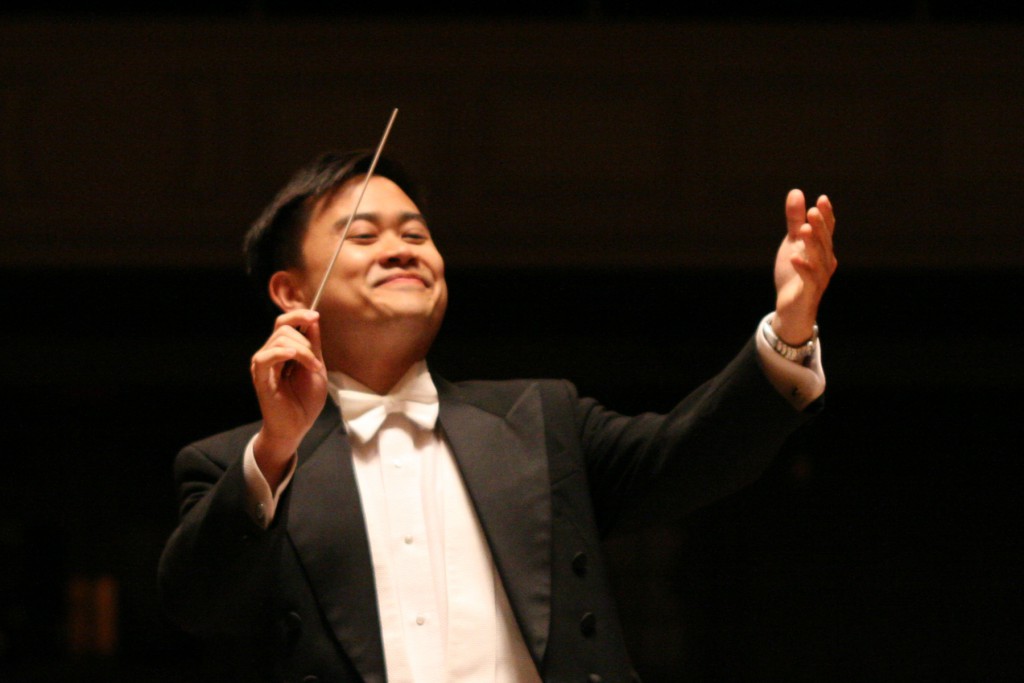Mercury (Orchestra) rises in Boston Landmarks’ muggy summer sendoff

Channing Yu and the Mercury Orchestra beat the heat with works by Shostakovich, Borodin and Tchaikovsky. Photo: Rick Peckham
It was fitting that on one of the hottest days of the year, an ensemble called Mercury had the task of wrapping up an outdoor concert series — and did so ably in an al fresco setting that came with no controls for climate or street noise. On Wednesday evening at the Hatch Shell, with the thermometer reading 94 degrees at curtain, the Cambridge-based Mercury Orchestra and conductor Channing Yu gave robust accounts of three colorful Russian works in the Boston Landmarks Orchestra’s summer finale.
Yu and his orchestra of talented local musicians opened with a spirited run-through of Dmitri Shostakovich’s Festive Overture. Rhythms were taut in the score’s majestic introduction and, while the tempo of the main fast secction felt a mite reined in, the exuberant character of the music came across strongly.
Similar qualities marked the Polovtsian Dances from Alexander Borodin’s uncompleted 1890 opera, Prince Igor. The Dances come at the end of Act II as part of an elaborate entertainment given for Igor’s wartime nemesis, the Polovtsian tribal chief Konchak,. The Mercury players proved to be light on their feet with these pieces, and in tune with the spirit and character of Borodin’s folk-influenced writing.
The first selection on Wednesday, “Dance of the Polovtsian Maidens,” was highlighted by some particularly graceful woodwind playing and clean articulations of the strings’ swirling figures. For the concluding set of dances with chorus, Mercury was joined by New World Chorale and its leader, Holly MacEwen Krafka. The vocal ensemble’s initial entrance was a bit tentative, but their tonal and rhythmic security grew as the piece proceeded, culminating in a full-throated, rousing “General Dance.”
After intermission, Yu led the players in a straightforward but emotionally involved reading of Piotr Ilyich Tchaikovsky’s Symphony No. 5. The first movement began with an appropriately weighty statement of the initial “fate” theme before eliding into a smartly paced and tightly measured account of the movement’s Allegro con anima. The slow second movement was fluently played, Yu’s tempos never dawdling. He also shaped the music’s powerful climaxes with a steady, discreet hand.
In the third movement, the dovetailing of the principal theme across the entire orchestra — especially through the woodwinds — was executed with remarkable delicacy. And if some of the finale’s tempos tended towards deliberateness, the playing brimmed with color and built to a rousing finish in the majestic coda.
Wednesday’s acoustic environment was perhaps not the best for fully appreciating Mercury Orchestra’s strengths. Between the the traffic on Storrow Drive and the bike/runners’ path on the Esplanade, it was difficult to gauge a true sense of orchestral balances and the nuances of the playing. Uneven projection from the Hatch Shell’s amplification system didn’t help matters.
Despite those constraints, Mercury’s intonation was solid, its textures clear, and its ensemble work tight. The orchestral solos in Tchaikovsky’s Fifth – some of the greatest in the symphonic canon – were impressively delivered.
Posted in Performances




